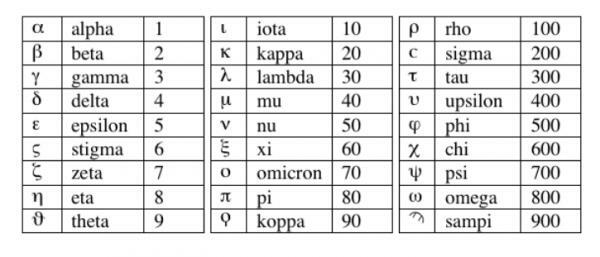History of the GREEK NUMBERS

The number systems They have evolved a lot throughout the history of humanity, varying through different cultures until reaching the universal system that we know today. In this lesson from a Professor we must talk about one of the first influential systems in the history of mankind and, therefore, we are going to offer a summary of the history of Greek numbers.
The first step to understand the history of Greek numbers is to talk about their background to understand and know the first issues of European cultures and the clear evolution towards the system of the Greeks. The two systems that had the greatest influence on the Greek people were the Mycenaean system and the Attic system.
- The Mycenaean system o Aegean numbering is the proper system of the Mycenaean civilizations Y Minoan. This system is only found in the Linear A and Linear B language tablets, there are not many more sources that tell us about its operation and we think that we have numerous symbols that served to represent the majority of numbers.
- The attic system was a very ancient system of the Greeks with many similarities to the Mycenaean system, but using a acrophonic variation, that is, giving a name to the first letter of the word. This system could be considered to be much more influential to the Greeks than the Mycenaean.
Already within what was Ancient Greece, the value of numbers occupied an important position in their culture from the first Hellenic peoples. The study of arithmetic It was considered one of the basic learnings for the evolution of the human being, with thinkers who focused all the reality of humanity in mathematics, Pythagoras being a clear example.
The great difficulty existing in the greek mathematicsAs both the Mycenaean and Attic systems were very difficult to achieve extensive and elaborate studies, they caused thinkers to Hellenes looked for a new system that would make the mathematical study something much simpler, this being what caused the creation of the system Ionic.

Image: Monografias.com
To continue with the summary of the history of Greek numbers, we must understand that this number system is known as Ionic, being the only method used by the Greeks from the 4th century BC. C. The influence of this system is so enormous that it was copied by other cultures and, even today, it is used in Greece for ordinal numbers, instead of the Roman mechanisms typical of other European areas.
The Ionian system is thought to have originated in the Ionian region of Miletus, being an area where mathematicians had enormous importance over the years. From the region of Ionia the Ionian system went expanding all over Greece slowly but steadily, Athens being one of the last areas to be influenced by the system.
The Ionic system is based on the fact that for each drive (1-9) there is one letter, for each ten (10-90) another different letter and for each hundred (100-900) another different letter. The letters used are those of the Greek alphabet, but when it has only 24 letters, and 27 being necessary for this system, three old letters are used that the general Greek alphabet no longer exists, these letters being:
- The stigma for the 6
- The qoppa for 90
- The sampi for the 900.
Other peculiarities of the Greek numbering system was the placement of a acute accent at the end of each group to distinguish between numbers and letters, which was based on the principle of addition so the values were added to form a number, or that to use a number above a thousand the same letters are used again but with an acute accent invested.
One of the most important elements of the Ionian system was the creation of the Hellenistic zero, an element that did not exist in previous systems and that was totally necessary for Greek mathematics to evolve. Based on the Egyptian number system, from which the Ionic system already derived various elements, the Greeks created a symbol to represent 0, being generally used as a way to complete figures and not as a number Independent.

Image: Overhistory
To conclude this lesson on Greek numbers we must briefly talk about the mathematical thinkers most important, being the main reason why Greek numbers are so relevant. The main Greek mathematicians are the following:
- Thales of MiletusConsidered one of the greatest sages in Greek history, he is known as one of the fathers of geometry.
- Pythagoras: Mathematician and philosopher, he considered that all things of reality were linked to mathematics, and he is considered the first pure mathematician in history.
- Euclid: Known as the father of geometry for his contributions to the book of the Elements.
- Apollonius: The person who gave names to figures such as the ellipsis or the parabola and who was able to solve the equations of the second degree.
- Archimedes: Creator of the exhaustive method and discoverer of PI number He was one of the key figures of Ancient Greece, especially for using mathematics for military life.



